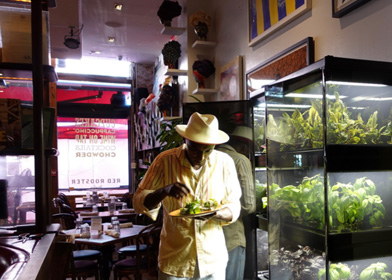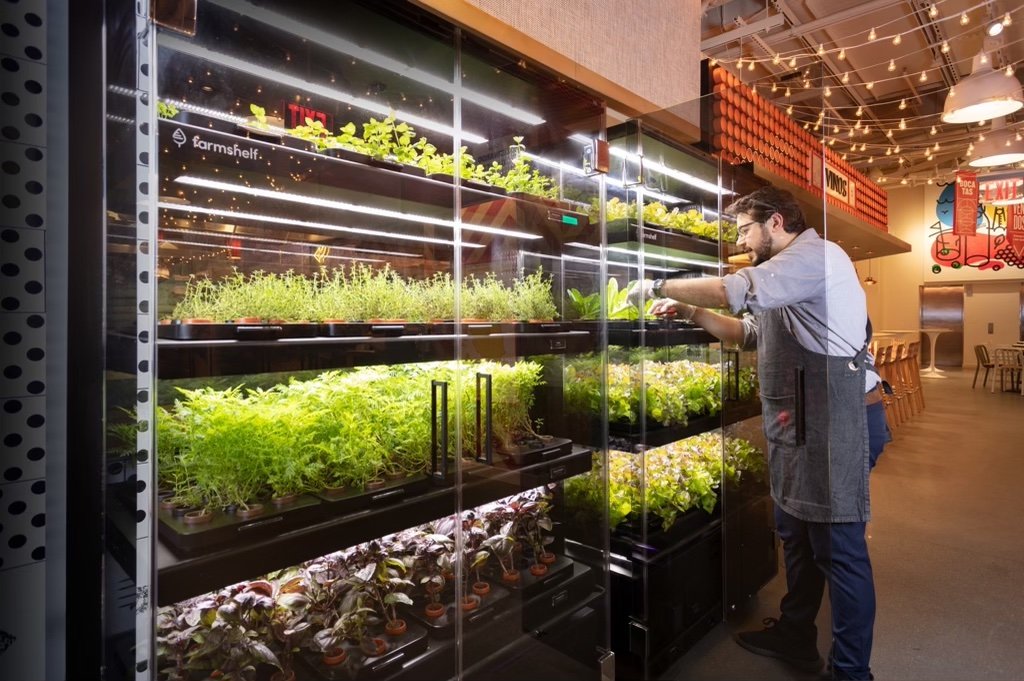
Product Perspective: Farmshelf
Intended as a supplement to your current foodservice strategy, Farmshelf provides its customers with an opportunity to grow healthy and nutritious produce faster than traditional farming methods utilizing state-of-the-art hydroponics, a smartly designed water filtration system and cloud-based technology, all while providing a robust support system. When displayed front and center, it makes a statement to your customers that you care about the ingredients in the meals that you serve and the environmental impact of the business that you operate.
Founded in 2016 in San Francisco, Farmshelf has been dedicated to making it easy for people to grow their own food. Whether you’re a corporate cafeteria, lobby of the newest hotel or independent restaurant, Farmshelf has been providing the tools, technology and resources to bring the farm home and a heightened level of freshness to the table.
A Complete Package
Providing its customers with everything needed to get up and running quickly, Farmshelf offers more than 50 varieties of leafy greens, herbs and edible flowers. Implementing a hydroponic growing process and incorporating a robust technology solution that utilizes LED lighting and a timed nutrient delivery water system, Farmshelf ensures your produce receives the perfect level of care and attention at the right time.

Hydroponics
Farmshelf’s hydroponic system offers an efficient growing process for your herbs and greens, and the results speak for themselves. Delivering meaningful yield and a growth schedule that is 2-3x faster than the more traditional farming methodology, produce is also grown free from the various chemicals that are commonly used for pest control. Adding to this list of benefits, Farmshelf’s environmentally controlled hydroponic system frees up growers to produce food at any time of the year, all while utilizing fewer resources.
App-Based Technology
Integrating current technology into their solution, Farmshelf’s “Green Thumb in the Cloud” provides advanced levels of support to effectively manage the success of each system. Built-in cameras and sensors continuously monitor and advise the user of any needed adjustments to irrigation and water cycles and provides intuitive analytics on plant growth. The lower, self-contained nursery – where early-stage seeds are grown out of sight – benefits from a separate water and lighting system that maximizes production levels.
Next Level Water Filtration
Acting as the primary source of nutrients, water is automatically pumped from the built-in tank to each individual plant shelf. This same nutrient-rich water is then filtered back down into the lower-level tank reservoir. Even with regular water replacement (with a secondary option to install a direct water line), there is a 90% reduction in the amount of hydration needed for optimal plant growth when compared to growing the same leafy greens in an outdoor environment. Farmshelf’s controlled water bath is continuously monitored and automatically adjusts and calibrates the required nutrients in order to compensate for when water levels may be too hard.
Plug and Play
The simplicity of the Farmshelf system is another stand-out feature. A unit can be positioned and operated practically anywhere, requiring nothing more than a power source and WI-FI connectivity, making set-up easy and the barrier of entry minimal. With a product dimension of W40” x H75” x D20”, its size and technological capabilities allow for convenient placement while, at the same time, stands out as a potential showpiece that offers engaging talking points for both customers and foodservice operators alike.
Environmentally Friendly
It’s becoming increasingly more common for foodservice operators to advertise and promote their decision to manage an environmentally friendly business. They understand there is a large percentage of their customer base that are actively seeking out and supporting businesses that promote this initiative. Proudly displaying a Farmshelf system for your customers to see is a great way to advertise how much you care about the environment, food safety, local ingredients, sustainability and food waste.